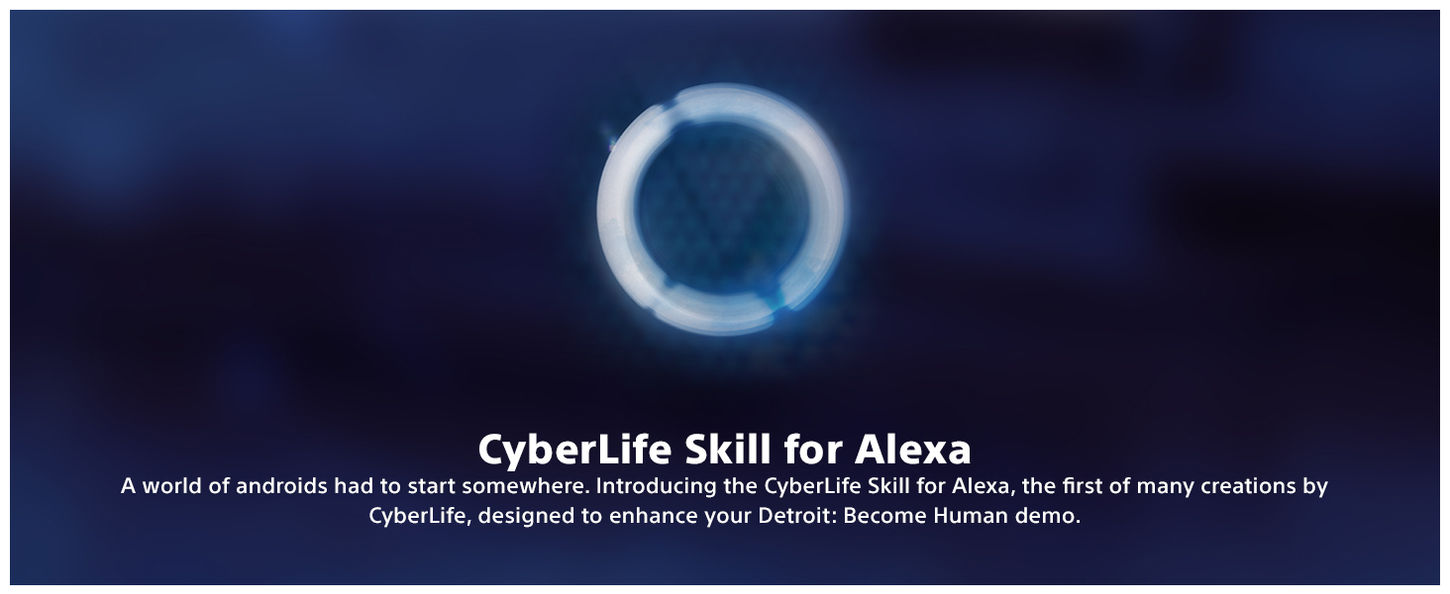Detroit: Become Human – Bringing CyberLife to Life
Sony PlayStation
Sector:
Gaming
Location:
San Mateo, CA, USA
Year:
2018






Description:
The Challenge: What If You Could Talk to the Game?
In Detroit: Become Human, artificial intelligence isn’t just a tool—it’s a force shaping the future of humanity. Players step into a world where androids are evolving, making choices, and questioning their place in society.
But what if players could do more than just play the game?
What if they could talk to CyberLife—the fictional AI megacorporation behind the android revolution? What if they could ask questions, uncover hidden details, and change how they experienced the game?
This wasn’t just another feature. It was an experiment in the future of gaming.
With Quantic Dream, Sony Interactive Entertainment, and Digitas, we created the CyberLife Alexa Skill—an interactive voice assistant that let players step even deeper into the world of Detroit: Become Human.
The Experience: Blurring the Line Between Game & Reality
For the first time, players could talk to the game.
The CyberLife skill functioned as a beta test of an “AI assistant” within the game’s universe—as if CyberLife itself was giving users access to a secret interface.
Players could ask questions, and CyberLife would respond with exclusive in-game knowledge, hints, and deep lore that weren’t available anywhere else.
"Alexa, ask CyberLife to initialize beta test."
"Alexa, ask CyberLife to tell me about the coin."
"Alexa, ask CyberLife why Connor failed to reach the deviant in time."
CyberLife responded in real-time, adapting to choices players made in the game, unlocking deeper interactions, and making them feel like they weren’t just playing a game—they were living inside it.
But to make this experience seamless, the technology had to work flawlessly.
That’s where I came in.
My Role: Ensuring CyberLife Felt Real
This project wasn’t just about making Alexa answer questions—it was about creating a believable AI experience inside one of the most immersive story-driven games ever made.
As part of the Digitas team supporting Sony Interactive Entertainment, I played a crucial role in QA engineering, voice command validation, and User Acceptance Testing (UAT) at PlayStation HQ.
✅ Scenario Testing – I tested every possible question against the skill’s responses to ensure accuracy, consistency, and in-game realism.
✅ Branching Narrative Validation – I ensured CyberLife’s responses reflected different player choices, alternative story paths, and moral decisions.
✅ Voice Command Testing – Alexa had to understand players the first time—no frustrating misfires, no repeated questions. I tested voice recognition across different accents, speech speeds, and phrasings to ensure a smooth, natural interaction.
✅ Cross-Device Compatibility – I conducted QA across multiple Alexa-enabled devices, verifying that smart speakers, mobile apps, and smart displays all responded correctly.
Leading UAT at PlayStation HQ
To make sure CyberLife felt like an authentic part of the game, I led User Acceptance Testing (UAT) at Sony PlayStation’s campus in San Mateo.
🔹 Real-World Scenario Testing – I ensured the skill worked exactly as intended when players activated it while gaming.
🔹 Stakeholder Collaboration – I worked directly with Sony, Quantic Dream, and in-house testers, gathering feedback and refining responses.
🔹 Final Refinements & Bug Fixes – Last-minute polish was essential. I worked side by side with developers to fix any inconsistencies in dialogue, timing delays, and AI response errors.
The result? A voice-driven experience that felt just as immersive as the game itself.
The Impact: A New Way to Play
Extended Player Immersion – The CyberLife skill blurred the line between the game world and reality, allowing players to interact with Detroit: Become Human like never before.
Voice-Driven Gameplay Innovation – One of the first major gaming franchises to integrate Alexa as a companion skill for interactive storytelling.
Seamless Cross-Platform Performance – Ensured that the CyberLife skill worked flawlessly across PlayStation, Alexa devices, and mobile platforms.
Flawless UAT Execution – PlayStation stakeholders signed off with confidence, thanks to the rigorous testing and fine-tuning that ensured an authentic, glitch-free experience.
This wasn’t just a companion feature. It was a first step toward voice-driven gaming experiences—one where players don’t just control the story, they can talk to it.
Why This Project Stands Out
For me, this project wasn’t just about QA—it was about building the future of interactive entertainment.
✔️ It pushed the boundaries of what a voice assistant could do in gaming.
✔️ It required deep collaboration between storytellers, developers, and QA engineers.
✔️ It challenged us to make AI feel real—to make CyberLife something players could trust, question, and engage with.
And for the first time, Detroit: Become Human wasn’t just a game.
It was a conversation.